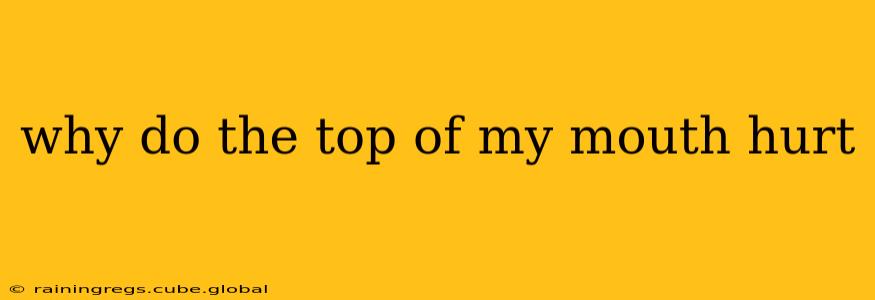A sore roof of your mouth, also known as the palate, can be incredibly uncomfortable and disruptive. The causes range from minor irritations to more serious underlying conditions. This comprehensive guide will explore the various reasons why the top of your mouth might hurt, helping you understand potential causes and when to seek professional medical advice.
What Causes a Sore Roof of the Mouth?
The pain in the top of your mouth can stem from various sources. Let's delve into some of the most common culprits:
1. Minor Injuries and Irritation:
- Accidental Burns: Hot food or drinks are a frequent cause of palate burns, leading to pain, redness, and sometimes blistering.
- Sharp Foods: Hard or sharp foods like potato chips or crackers can scrape or cut the delicate tissues of the palate.
- Dental Appliances: Ill-fitting dentures, braces, or retainers can cause friction and irritation, leading to soreness.
- Mouthguards: Improperly fitted or abrasive mouthguards used for sports can also irritate the palate.
- Dry Mouth: A lack of saliva can make the palate more vulnerable to irritation and dryness, leading to discomfort.
2. Infections:
- Oral Thrush (Candidiasis): A fungal infection caused by Candida albicans, often manifesting as white patches or creamy lesions on the palate, accompanied by pain and burning. This is more common in individuals with weakened immune systems or those taking antibiotics.
- Viral Infections: Some viral infections, such as herpes simplex virus (HSV), can cause painful sores or blisters on the palate.
- Bacterial Infections: Although less common, bacterial infections can also cause palate inflammation and pain.
3. Medical Conditions:
- Apthous Ulcers (Canker Sores): These small, painful ulcers can appear anywhere in the mouth, including the palate. While the exact cause is unknown, stress, hormonal changes, and nutritional deficiencies are suspected contributing factors.
- Geographic Tongue: This benign condition causes patches on the tongue and sometimes the palate to appear smooth and red. While usually painless, it can occasionally be accompanied by a burning sensation.
- Lupus: This autoimmune disease can affect various parts of the body, including the mouth, causing sores and inflammation.
- Pemphigus Vulgaris: A rare autoimmune disorder that causes painful blisters and ulcers in the mouth and on the skin. This requires immediate medical attention.
4. Allergies:
- Food Allergies: Allergic reactions to certain foods can sometimes manifest as mouth sores or inflammation.
5. Medications:
Certain medications can cause dry mouth or other side effects that irritate the palate.
How Long Does Roof of Mouth Pain Last?
The duration of pain depends heavily on the underlying cause. Minor irritations from burns or scrapes typically heal within a few days to a week. Infections may take longer to resolve, requiring medical treatment. Chronic conditions like geographic tongue can persist for extended periods. If the pain persists for more than a week or is severe, it's crucial to seek professional medical attention.
When Should I See a Doctor?
Consult a doctor or dentist if:
- The pain is severe or persistent.
- You have difficulty swallowing or eating.
- You notice significant swelling or bleeding.
- You have a fever or other systemic symptoms.
- The pain is accompanied by white patches or lesions that don't heal.
- You suspect an underlying medical condition.
Home Remedies for Palate Pain (For Minor Irritations Only)
For mild irritation, consider these home remedies:
- Rinse your mouth with warm salt water: This helps soothe the area and reduce inflammation.
- Apply a cold compress: This can help numb the pain and reduce swelling.
- Avoid acidic or spicy foods: These can irritate the already sensitive area.
- Use a soft-bristled toothbrush: To avoid further irritation.
- Stay hydrated: This helps maintain saliva production.
Disclaimer: This information is for general knowledge and does not constitute medical advice. Always consult a healthcare professional for diagnosis and treatment of any medical condition. This information is not a substitute for professional medical advice, diagnosis, or treatment. Always seek the advice of your physician or other qualified health provider with any questions you may have regarding a medical condition. Never disregard professional medical advice or delay in seeking it because of something you have read online.
